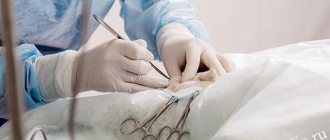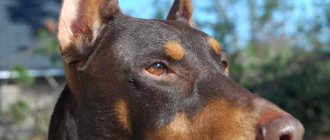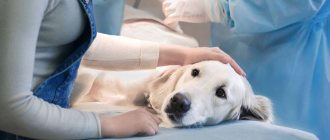Advantages and disadvantages
Veterinarians believe that Spitz dogs can and should be castrated/sterilized. Especially if they do not participate in breeding, are removed from it for some reason and there are no contraindications to surgery.
The procedure has pros and cons that must be taken into account. Pros of castration:
- Dog behavior is changing. They stop being aggressive towards other dogs.
- The pet stops dominating the owner and children.
- The dog does not mark his territory and is easier to train him to wear a diaper.
- The animal does not jump on things, toys, arms, legs with characteristic movements.
- A male dog does not seek to run away from home in search of love.
An equally significant advantage is the increase in life expectancy. On average, Spitz live 14 years, and surgery will extend life by 1.5-2 years.
Castration is not a behavior correction method. It will not make the Spitz more obedient, less active, and will not instill love for children if it was not there in the first place.
Castration does not affect training and education in any way. The Spitz does not become less active or lethargic. The male who loved to play remains just as active.
Disadvantages of castration:
- There is a risk of complications during and after surgery. For example, infection, suppuration of stitches or licking by a dog.
- There are also disadvantages of castration, which are associated with risks during anesthesia. However, the operation is quite simple and all surgeons do it, so the risks are minimized.
- The owners are worried that the pet will become fat. Yes, neutered animals are more prone to gaining excess weight. However, obesity can also occur in an uncastrated dog due to poor nutrition and overfeeding of the animal. After the procedure, you need to review the diet, reducing the calorie content of the feed by 10%. With proper nutrition and exercise, your Spitz will not get fat, as many dog owners think. It is not the fact of castration itself, but an incorrect attitude towards feeding that is the main reason for weight gain.
- Owners are no less worried that surgery on the genital organs is the cause of the development of urolithiasis. Studies have shown that castration does not affect the development and function of the urethra.
Castration of dogs: pros and cons
Unfortunately, castration of dogs is not the simplest operation, although it is a typical one. Also, dogs are often sterilized, but unlike this, the dog’s genitals are removed, which can lead to a number of complications. However, there are also a number of advantages. Of course, if they did not exist, castration would not be so popular among owners.
- The most important difference is the dog's behavior. It is changing for the better:
- the male does not mark his territory (the female is not in heat);
- the dog’s aggressive behavior disappears, it stops attacking everything;
- The pet loses sexual desire, which often leads to not the best consequences.
Many owners believe that when a dog is castrated, it is bullying. They believe that the operation is inhumane and cruel. However, it is worth noting that if you do not intend to breed an animal and raise offspring, then this condition for the dog will be even more painful than after castration.
At what age should you castrate? How does age affect castration?
- At what age is it better to neuter a dog?
- For dog breeds that do not reach large sizes, it is best to castrate at the age of 7-8 months, when they are still puppies. If the breed is large, then it is between a year and a year and a half old.
- It is worth focusing not only on the age, but also on the individual characteristics of the dog. Within the specified age limits, the dog had already developed a sexual desire, a desire to mark territory appeared, and aggression in behavior began to develop. You need to choose such a period and it will be the best for the operation.
- Castration can also be carried out at a later age, even for very old dogs over 5 years old. But the health of a dog at this age leaves much to be desired. The sutures take a long time to heal, complications and restoration of the reproductive system are possible.
Dog castration: reasons for doing it
- There are the following two medical reasons for performing castration surgery on dogs:
- Various diseases and tumors, for example testes. This also includes cysts in the prostate area, inflammation of the organs, and cryptorchidism. Surgery is performed on dogs for both preventative and therapeutic purposes. Thanks to castration, the possibility of diseases of the genitourinary system, as well as some diseases that are sexually transmitted, is reduced.
- Reasons that are related to behavior: for example, the dog behaved aggressively, rushed about, attacked things and people.
It is aggressiveness that is considered the main reason why owners turn to veterinarians for help and with a request for castration. There is no one hundred percent guarantee that behavior will change for the better. However, the experts of our medical center will advise you on all questions that arise, conduct the necessary tests and make their expert opinion.
Castration options
There are several methods for castrating dogs:
- Classic - an incision is made in the scrotum, the testes are removed, a special thread is placed on the cords and the testicles are cut off.
- The second option is to use a special adhesive agent instead of a thread, which eliminates bleeding.
- Another option is a biological node. It differs little in effectiveness from the first. The spermatic cord and vessel are removed and tied together. The testis is removed.
- Chemical castration. A method in which an implant containing a hormonal drug is inserted.
The advantage of chemical castration is its reversibility. 6-12 months after the procedure, the male dog begins to be interested in the opposite sex again.
Chemical castration
The essence of chemical castration is the administration of a drug that blocks the production of sex hormones.
After administration, the drug begins to act after 4-5 weeks: libido decreases, the size of the testicles decreases by 2-3 times. The male becomes calmer, does not run after females in heat, and is not aggressive towards other males.
After a certain period after castration (six months or a year, depending on the dose), the administered drug ceases to act, and the animal’s sexual functions are restored.
After 5-10 weeks, the dog fully restores its ability to reproduce. The advantage of the drug is that if the owner wants to breed a male dog, the implant can be removed if more than 4 months have passed.
Most often in their practice, doctors use the drug Suprelorin (the active substance deslorelin). This is a non-steroidal contraceptive. An implant is inserted subcutaneously, from which the substance is continuously and slowly absorbed into the blood.
However, chemical castration is an expensive procedure. The drug itself is also quite expensive. But it has advantages. It is indicated in the following cases:
- Temporary castration is required.
- If you need to find out what is causing the dog’s aggression. If the incorrect behavior disappears when the implant is inserted, then you can decide on classical castration. You should not expect your dog's behavior to change immediately after surgery. At first, the Spitz may behave the same as before castration, and only over time does the behavior change.
- As part of complex therapy for prostate hyperplasia.
- Treatment of alopecia X, a pathology that affects Pomeranians. It is used in both males and females.
Dog castration: next day
It is in the first days that it is decided how the pet will recover after surgical intervention in its sex life. It is worth remembering that the operation is performed under anesthesia, and it has a strong effect on the body and the pet will recover slowly. His body temperature decreases, processes in the body slow down. Therefore, the dog requires additional warmth, as well as careful transportation and a more comfortable place to lie and recover.
Although the dog needs warmth, it should never be placed on a heating pad or near a radiator or fireplace, as internal bleeding may develop. She should sleep and recover on a soft, warm mattress in a warm room. After anesthesia, the pet does not immediately come to its senses, so it is necessary to ensure control of the dog at the moment when it wakes up. But you should be careful, because the dog’s behavior after castration can be unpredictable. The pet does not understand where it is, what happened to it, and often it can be aggressive in the first minutes after rising. It will be difficult for the dog to stand on its paws and walk somewhere. The owner needs to be affectionate with the animal, caress it and speak in a calm voice. Do not make sudden movements or make loud sounds.
Best age for castration
If Spitz females are recommended to be sterilized at 4-5 months, then the optimal age for castration of males is 6-9 months, but not earlier. The fact is that if a male dog is castrated before 6 months of age, he may experience developmental delays.
If the dog has diseases, then before castrating the animal, they need to be cured. This is especially true for kidney and cardiovascular diseases.
Late castration (in males older than 7 years) has negative consequences. During this period, indicators of general health have already decreased. Therefore, the operation is more difficult to endure and the sutures take longer to heal.
Preparation, performance and care after surgery
The day before the operation, the dog is put on a starvation diet. The animal is allowed to drink only water. The operation time is short - 15-20 minutes.
Stages of castration in the classical way:
- The dog is given anesthesia at the withers.
- Antiseptic treatment is carried out.
- A longitudinal incision is made in the scrotum.
- The testes are removed.
- Sutures are placed on the scrotum.
In the clinic (most often according to indications) the scrotum can also be removed. As a result, it looks more aesthetically pleasing, but more expensive.
The postoperative period in males is short. The owner will be required to monitor the pet, since immediately after the operation the animal recovers from anesthesia for a long and difficult time. Chills, nausea, and unsteady gait are noted. The dog may walk under itself and be disoriented in space.
Within 2-10 hours the male comes to his senses. At home, the seams are treated with an antiseptic or ointment, which the doctor will prescribe. Treatment is carried out 1-2 times a day for 1.5-2 weeks.
Males are advised to wear a protective collar to prevent them from licking the stitches. No bandages are applied.
The sutures are removed in a veterinary clinic or at home after 10-12 days. There are practically no postoperative complications in male dogs.
Dog castration: postoperative period
- Basic rules for caring for a dog after castration, after several days, so that recovery goes quickly:
- At first, there is a risk of a decrease in heart rate or even stopping breathing. You should monitor these parameters and feel the dog's pulse. No one knows how the animal will survive the anesthesia and how it will affect her.
- You need to take care of your dog's stitch. All necessary recommendations for their care will be given by the attending surgeon at our center.
- If the pet shows that it is in pain (the dog whines or rushes about), then it should be given an anesthetic. You will also have to adhere to the diet prescribed by the treating veterinarian for some time, and you should not walk the dog a lot. If you are walking, be sure to wear a muzzle and use a collar and leash. Remember that cleaning the wound and sutures is very important after any operation.
Feeding is an important part of dog rehabilitation - dog castration
After dogs have been castrated, special recovery is necessary. Feeding is the main component of a dog’s recovery. The attending physician will prescribe the foods and water that can and should be used, and will also tell you what to feed and water the dog under no circumstances. It is also important to say that immediately after anesthesia the dog should not be fed for about a day. Only then will she be able to hold her head up, chew and swallow on her own. Drinking water can be given only a little if she is able and drinks without problems such as eating.
It is worth remembering and keeping in mind that some time after the operation the dog’s hormonal balance has changed quite significantly. Therefore, not only the food should be agreed upon with the doctor, but also the portion size. Most often, it becomes smaller enough to reduce the risk of obesity in the animal.
Refusal to take food prescribed by your doctor after surgery is a bad sign. You should immediately contact your veterinarian and ask for further action. After a thorough examination, which can be carried out in your home, given the difficulty of transportation after the operation, the doctor will give further instructions and also ask some questions: does the animal drink, how does it behave, etc.
Castration of dogs: negative consequences
Negative consequences after castration of a dog can occur due to non-compliance with doctor’s instructions.
- Possible negative consequences:
- Pus on the sutures, dehiscence (Wound treatment is important);
- Infection of the suture space;
- Incontinence;
- Hernia;
- Tumor development;
- Non-healing bruise in the area of the stitches;
- Inflammatory period for stitches, if you do not follow the doctor’s instructions.
- There are consequences that are less dangerous, but you need to be prepared for them, for example:
- Vomiting, often immediately after recovery from anesthesia;
- Incontinence;
- Stress;
- An increase in body temperature or, conversely, a decrease;
- Metabolic disorders after surgery.
In the longer term, your dog may become overweight and obese due to hormonal changes. This is a bad sign, because it puts a lot of stress on the dog. To avoid this or correct the current situation, physical activity is necessary, as well as proper nutrition, which will be prescribed by your doctor. After castration, you should also be examined by a veterinarian, since obesity can be not only external, but also inside the organs, which will have an even worse effect on the dog’s health.
However, all these consequences can only be due to the negligence of the owners. If you look after the dog and follow the doctor's instructions, then everything will be fine and the dog will recover very quickly. Moreover, after recovery she will become more obedient, happy and playful. Will not lunge at people or things.











